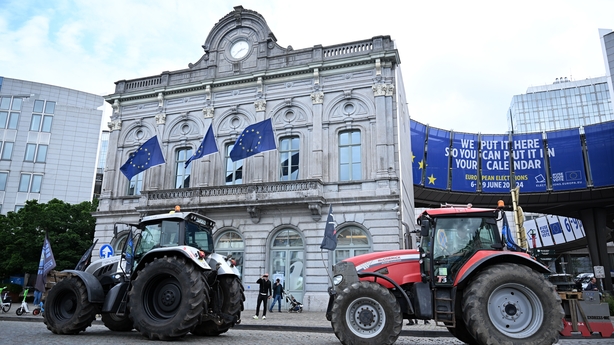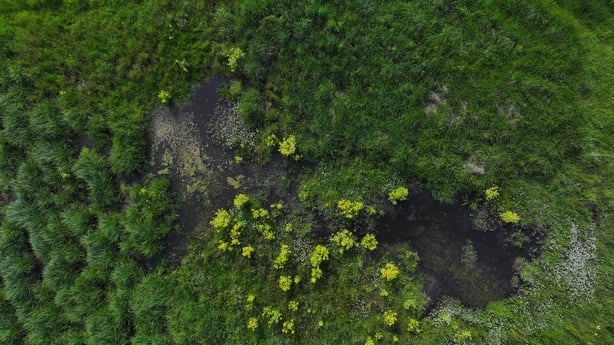An investigation into how member states are using EU agriculture funds to meet climate goals has concluded that Ireland has not complied with new CAP funding requirements, designed to reduce greenhouse gas emissions, to the full extent possible.
The report, by the European Court of Auditors, said it was "a lost opportunity" to help reduce the carbon footprint of the dairy sector.
Auditors also noted that Ireland had delayed plans to protect peatlands and wetlands, a requirement under the EU's Green Deal to reduce emissions.
The scale of Ireland’s dairy sector, and its impact on greenhouse gas emissions, as well as the management of peatlands, have both drawn fire from environmental groups in recent times.
Teagasc and the Irish dairy industry have repeatedly said the sector is highly efficient in having a low emissions footprint, a claim that is challenged by some scientists.
The European Court of Auditors today published its report into the extent to which the European Commission and member states have been jointly successful in tailoring Europe’s huge Common Agriculture Policy (CAP) to help reduce greenhouse gas emissions.
The investigation comes in the wake of violent farmer protests in a number of EU countries over the impact of new climate regulations. The European Commission watered down some of the measures in the spring, under pressure from the protests.
Officials said Ireland - as well as France, Spain and Poland - were singled out for the investigation because of the size of their farming sectors, but also - in Ireland’s case - because of the size of dairy production.
The CAP represents nearly one third of the overall EU budget, with €378.5 billion going to income support for farmers, food security and the livelihood of rural areas.
Farming in Europe produces a total of 13.1% of the continent’s total greenhouse gas emissions.

The most recent CAP reform requires governments and farmers to reduce the emissions impact of the sector, and to reach higher environmental targets.
EU auditors found that while the 2023-2027 CAP budget emphasises climate goals more than its predecessor, it still does not match the EU’s overall climate ambitions and that "key elements for assessing green performance are missing".
They also found that success in reducing emissions had been curtailed by the Commission watering down some measures.
"[The CAP’s] actual impact on the climate and the environment is affected by the recent measures introduced… in response to farmers’ requests," the report concluded.
The auditors stress that the report mainly focuses on the impact of the European Commission’s policies via the CAP, but there are also criticisms of member state national plans to reduce agriculture emissions, and how farmers make use of the CAP regulations to do so.
The report finds that member states do not provide enough data to allow the Commission to assess the CAP’s contribution to climate targets, and that agricultural practices that might lower emissions further were not covered in the national plans which are submitted to the EU for approval.
Under the new CAP, farmers receiving payments must fulfil stricter agricultural and environmental conditions when it comes to public, animal and plant health and the environment.
New so-called eco-schemes, which come under direct payments to farmers and are designed to encourage environmental practices, require that a minimum of 25% of payments be spent on climate measures, while 35% of rural development spending should also benefit the environment and reduce emissions.

In its impact assessment, the European Commission estimated that the new climate compliance costs and constraints could cause a decrease overall in farming income of between 5% and 10%, although a specific study on eco-schemes and rural development measures also found the decrease could be between 2.1% and 3.5%.
Member states submitted national plans to the Commission on how they would implement the new measures, with Brussels providing feedback and suggestions on meeting climate targets.
While the Court of Auditors found that the new requirements meant an increase in ambition in lowering carbon emissions, it depended on how member states translated these requirements into their national plans, and the uptake by farmers.
According to today’s auditors’ report, Ireland only "partly" followed the Commission’s suggestions.
It said: "The Commission pointed to the modest environmental value of some of the practices proposed under the eco-scheme proposed by Ireland.
"While the Irish authorities strengthened the requirements of some practices, they mostly kept the original [predecessor] eco-scheme, as their strategy focused on maximising participation by farmers."
The report also said that in response to a Commission suggestion, that Ireland’s measures to mitigate the impact of the dairy sector on greenhouse gas were "not sufficient", the Irish authorities responded that "complementary national initiatives" would address the problem.
Court of Auditors official Kristian Sniter told RTÉ News: "We have seen that the eco-schemes were not targeted so much [towards emissions reductions], in the sense that 91% of farmers in Ireland were already eligible from the start to the [predecessor] eco-schemes, so they will receive a payment without changing their practices, without being more ambitious."
He added: "The Commission asked when the Irish plan to have more measures for the dairy sector [would be due]. The reply from Ireland was that they had their own national plans, which, of course, we cannot audit.
"But that's a lost opportunity. They had a chance to use CAP funds to support the sector's transition to a more climate friendly approach. But this was not used."

The auditors also found that Ireland, and some 15 other member states, "postponed the requirement to protect peatlands and wetlands… as the areas were not fully mapped."
The report noted that both Ireland and Poland "are large emitters of greenhouse gases from peatland agriculture.
"What we regret is that there was no effort to restore peatlands," Mr Sniter told a news conference.
"So when there are peatlands that had been transformed into agricultural land, to [then] go back, to restore them, to use them as carbon sinks and to promote this effort, there was not much of this in the [Irish national] plan."
According to the report, the EU target for carbon storage in peatlands was 35%.
"The Commission assessed Ireland’s target (8.9%) as low, but Ireland did not change it," the report states.
According to the European Environment Agency, the projections by member states of greenhouse gas storage in peatlands, as submitted in national plans in 2023, were not sufficient to meet the 2030 targets of carbon reduction.








